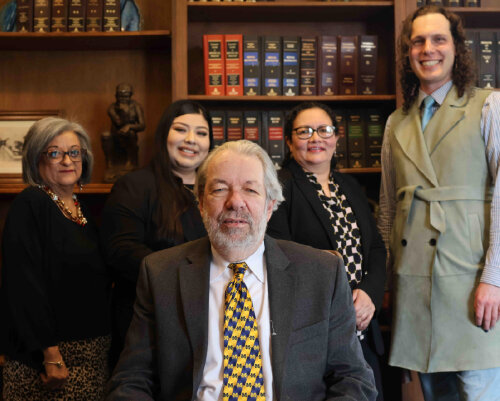Best Toxic Mold Lawyers in Grand Rapids
Share your needs with us, get contacted by law firms.
Free. Takes 2 min.
List of the best lawyers in Grand Rapids, United States
About Toxic Mold Law in Grand Rapids, United States:
Grand Rapids, like many other cities in the United States, faces issues with toxic mold in residential and commercial properties. Toxic mold can pose serious health risks to individuals who are exposed to it, leading to respiratory problems, allergies, and other health issues. As such, there are specific laws and regulations in place to address toxic mold contamination and determine liability.
Why You May Need a Lawyer:
If you are dealing with toxic mold in your property, you may need a lawyer for various reasons. Some common situations where legal help is necessary include: - Determining liability for the mold contamination - Negotiating with landlords or tenants regarding mold remediation - Filing a lawsuit for damages due to mold exposure - Understanding your rights and responsibilities under local laws
Local Laws Overview:
In Grand Rapids, there are specific regulations that govern toxic mold contamination in properties. Landlords are required to maintain safe living conditions for tenants, which includes addressing any mold issues promptly. If a property is found to have toxic mold, the landlord may be held liable for damages. It is important to familiarize yourself with the local laws and regulations regarding toxic mold to protect your rights.
Frequently Asked Questions:
Q: Is my landlord responsible for addressing toxic mold in my rental property?
A: Yes, landlords in Grand Rapids are required to maintain safe living conditions, which includes addressing toxic mold contamination.
Q: How can I prove that toxic mold is present in my property?
A: It is recommended to have a professional mold inspection and testing done to determine the presence of toxic mold.
Q: Can I sue my landlord for damages caused by toxic mold exposure?
A: Yes, you may be able to file a lawsuit against your landlord for damages resulting from toxic mold exposure.
Q: What should I do if I discover toxic mold in my property?
A: Contact your landlord immediately and document the mold contamination with photos or videos.
Q: Are there time limits for taking legal action against toxic mold exposure?
A: Yes, there are statutes of limitations for filing a lawsuit for damages due to toxic mold exposure. It is important to act promptly.
Q: Can I be evicted for reporting toxic mold in my rental property?
A: No, landlords cannot retaliate against tenants for reporting unsafe living conditions, including toxic mold.
Q: What are my rights as a tenant regarding toxic mold in my rental property?
A: Tenants have the right to live in a safe and habitable property, which includes mold-free living conditions.
Q: How can a lawyer help me with my toxic mold case?
A: A lawyer can provide legal advice, represent you in negotiations or court proceedings, and help you understand your rights under local laws.
Q: How much does it cost to hire a lawyer for a toxic mold case?
A: Legal fees for toxic mold cases may vary, but some lawyers offer free consultations and work on a contingency fee basis, meaning they only get paid if you win your case.
Q: Are there any government resources available for assistance with toxic mold issues?
A: The Environmental Protection Agency (EPA) provides information on mold prevention and remediation, which can be helpful for dealing with toxic mold contamination.
Additional Resources:
- Environmental Protection Agency (EPA): https://www.epa.gov/mold
- Grand Rapids Housing Commission: http://grhousing.org/
Next Steps:
If you are dealing with toxic mold in your property and need legal assistance, it is important to consult with a qualified lawyer who specializes in toxic mold cases. Contact a legal professional to discuss your situation and explore your options for addressing the toxic mold contamination.
Lawzana helps you find the best lawyers and law firms in Grand Rapids through a curated and pre-screened list of qualified legal professionals. Our platform offers rankings and detailed profiles of attorneys and law firms, allowing you to compare based on practice areas, including Toxic Mold, experience, and client feedback.
Each profile includes a description of the firm's areas of practice, client reviews, team members and partners, year of establishment, spoken languages, office locations, contact information, social media presence, and any published articles or resources. Most firms on our platform speak English and are experienced in both local and international legal matters.
Get a quote from top-rated law firms in Grand Rapids, United States — quickly, securely, and without unnecessary hassle.
Disclaimer:
The information provided on this page is for general informational purposes only and does not constitute legal advice. While we strive to ensure the accuracy and relevance of the content, legal information may change over time, and interpretations of the law can vary. You should always consult with a qualified legal professional for advice specific to your situation.
We disclaim all liability for actions taken or not taken based on the content of this page. If you believe any information is incorrect or outdated, please contact us, and we will review and update it where appropriate.








